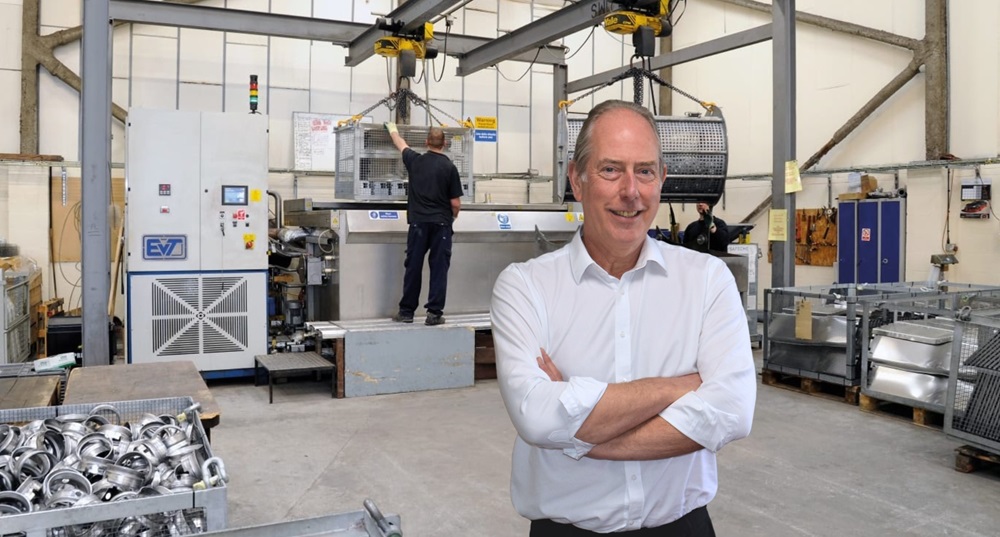Why UK Manufacturing’s Future Lies in the Details — and the Degreasing Bay

As UK manufacturing looks to rebuild momentum after years of economic headwinds, the spotlight is rightly falling on growth sectors like clean energy, aerospace, and defence. But amid the high-level strategy and billion-pound investment pledges, the real work happens in the background — in the precision finishing shops, the component prep lines, and the often-overlooked corners of the supply chain.
For Chris Arrowsmith, Managing Director of Midland Deburr & Finish, that reality is front and centre every day. “People tend to think of metal degreasing as a basic task,” he explains. “But there’s nothing basic about it when your part is heading into a jet engine, a medical device, or an offshore assembly. Get it wrong, and the whole system can fail.”
Degreasing — whether via traditional solvent methods or more modern vapour degreasing — is an essential part of any quality manufacturing process. It removes oils, machining fluids, and microscopic contaminants that, if left untreated, can compromise adhesion, increase corrosion, or lead to outright failure in service.
“At our level, we’re often the last people to touch a part before it’s assembled or coated,” says Arrowsmith. “If our cleaning process isn’t absolutely right, it can throw off the entire supply chain. That’s why we invest in high-integrity methods and trained operators who understand the stakes.”
One of the most effective techniques in use today is vapour degreasing — a solvent-based process that uses heated vapour to dissolve contaminants from metal surfaces. “It’s particularly effective for complex geometries and high-spec metals like aluminium and stainless steel,” Arrowsmith notes. “It gives you a uniform, contaminant-free finish with minimal handling — which is exactly what you need in precision manufacturing.”
Across the country, thousands of small and medium-sized manufacturers like Midland Deburr are grappling with the same pressures: doing more with less, maintaining quality in the face of cost pressures, and preparing for a wave of emerging opportunities in clean energy, aerospace, and advanced engineering.
“There’s a huge focus right now on things like small modular reactors, wind turbines, and the next generation of defence platforms,” says Arrowsmith. “But what’s sometimes forgotten is that all of those rely on a functioning, capable, and confident supply chain underneath them.”
And that supply chain needs support — not just in capital equipment, but in policy stability, skills development, and recognition of its strategic importance. “We’re not the ones making the headlines,” he adds, “but we’re the ones making sure components are fit for purpose. That’s what keeps these programmes on track.”
Despite recent global disruptions — from Brexit and COVID-19 to volatile energy markets — there is a growing sense that UK manufacturing could be at a turning point. Industry leaders are calling for long-term industrial strategy, integrated sectoral planning, and targeted investment in the foundational processes that enable innovation.
Arrowsmith agrees: “If we’re serious about reindustrialising Britain, we have to value the fundamentals — and that means recognising that surface finishing, cleaning, and quality prep are mission-critical.”
And while many in the industry have grown used to operating in a reactive, crisis-driven mode, there is growing appetite for a return to proactive investment. “Now’s the time to restore confidence across the sector,” he says. “Because if we get that right, we can build a supply chain that’s resilient, responsive, and ready for what’s next.”
Ultimately, the future of UK manufacturing depends not just on new factories and flagship programmes, but on the quiet, precise work being done every day by SMEs. In places like Stourbridge, where Midland Deburr & Finish operates, those processes are already in motion.
“Our job is to make sure the parts are perfect before they move to the next stage,” says Arrowsmith. “That might not sound glamorous, but it’s the kind of detail that defines success — and it’s what we do best.”
Quick Contact Form
